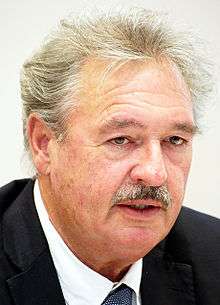Jean Asselborn
| Jean Asselborn | |
|---|---|
 | |
| Minister for Foreign and European Affairs | |
|
Assumed office 31 July 2004 | |
| Prime Minister |
Jean-Claude Juncker Xavier Bettel |
| Preceded by | Charles Goerens |
| Deputy Prime Minister of Luxembourg | |
|
In office 31 July 2004 – 4 December 2013 | |
| Prime Minister | Jean-Claude Juncker |
| Preceded by | Lydie Polfer |
| Succeeded by | Etienne Schneider |
| Personal details | |
| Born |
27 April 1949 Steinfort, Luxembourg |
| Political party | Socialist Workers' Party |
| Alma mater | Nancy 2 University |
Jean Asselborn (born 27 April 1949) is a Luxembourgish politician who has served in the government of Luxembourg as Minister for Foreign Affairs since 2004. He also served as Deputy Prime Minister from 2004 to 2013, under Prime Minister Jean-Claude Juncker.[1]
Early life and career
After leaving school at the age of 18, Jean Asselborn obtained a diplôme de fin d’études secondaires from the Athénée de Luxembourg in 1976. In October 1981, Jean Asselborn was awarded a master's degree in private judicial law from the University Nancy II.
Jean Asselborn launched his professional career in a Uniroyal laboratory in 1967. It was during this time that he became actively involved in the trade union movement and was elected youth representative of the Federation of Luxembourg Workers (Lëtzebuerger Aarbechterverband), the precursor to the current OGBL trade union.
In 1968, Jean Asselborn joined the municipal administration of the City of Luxembourg, but he returned to Steinfort in 1969 to work as a civil servant also. Upon obtaining his final secondary school diploma, Jean Asselborn became the administrator of the Intercommunal Hospital of Steinfort (Hôpital intercommunal de Steinfort) in 1976, a post he held until 2004. He became Mayor of Steinfort in 1982 and served in that position until 2004.
In government
Following the legislative elections of 13 June 2004, Jean Asselborn joined the government as Deputy Prime Minister, Minister of Foreign Affairs and Immigration on 31 July 2004.
Upon the return of the coalition government formed by the Christian Social Party (CSV) and the Luxembourg Socialist Workers' Party (LSAP) as a result of the legislative elections of 7 June 2009, Jean Asselborn retained the offices of Deputy Prime Minister, Minister of Foreign Affairs on 23 July 2009. In October 2012, at his instigation, Luxembourg was for the first time elected to a non-permanent seat on the United Nations Security Council for 2013 and 2014.
Following the legislative elections of 20 October 2013, Asselborn was appointed Minister of Foreign and European Affairs, Minister of Immigration and Asylum on 4 December 2013 in the coalition government formed by the Democratic Party (DP), the LSAP and the Green Party (“déi gréng”).
As of July 2004, Asselborn represents the Luxembourg government at the Council of Ministers of the European Union in its Foreign Affairs and General Affairs configurations. Jean Asselborn is currently the longest-serving minister among the Ministers of Foreign Affairs of the European Union.
Controversies
In early September 2016, Jean Asselborn caused a furore when he called for Hungary to be suspended or expelled from the European Union over its treatment of refugees, resulting in a backlash from Hungary and criticism from other European Union foreign ministers.[2][3]
Honorary distinctions
In December 2010, Jean Asselborn was awarded the Grand Cross of the Order of Merit (Großkreuz des Verdienstordens) of the Federal Republic of Germany.
In October 2013, he was appointed Commander of the National Order of the Legion of Honour (Ordre national de la Légion d’honneur) of the French Republic.
See also
| Wikimedia Commons has media related to Jean Asselborn. |
- Juncker-Asselborn Ministry I (2004 – 2009)
- Juncker-Asselborn Ministry II (2009 – 2013 )
- Bettel-Schneider Ministry (2013 - )
External links
Footnotes
| Party political offices | ||
|---|---|---|
| Preceded by Ben Fayot |
President of the Socialist Workers' Party 1997–2004 |
Succeeded by Alex Bodry |
| Political offices | ||
| Preceded by Jean Spautz |
President of the Chamber of Deputies 2004 |
Succeeded by Lucien Weiler |
| Preceded by Lydie Polfer |
Deputy Prime Minister of Luxembourg 2004–2013 |
Succeeded by Etienne Schneider |
| Preceded by Charles Goerens |
Minister for Foreign Affairs 2004–present |
Incumbent |
| Diplomatic posts | ||
| Preceded by Ben Bot |
President of the Council of the European Union 2005 |
Succeeded by Jack Straw |